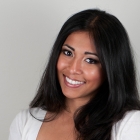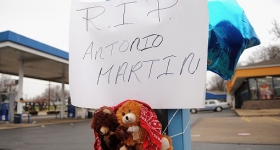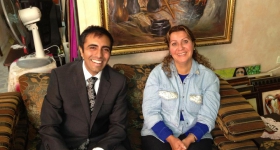2011 panel on the impact of 9/11 on rights and liberties of Arabs, Muslims, Sikhs
and South Asians, with advocates from the
Muslim and Sikh communities. Photo by S. Nadia Hussain
Hate crimes against Sikhs have made the
news again and again. From direct post-9/11 racial attacks that resulted in the
murder and assault of Sikh men, to the Oak Creek Massacre of last year and the
attack just two weeks ago of Prabjhot Singh -- a physician and professor in New
York City who was brutally beaten and taunted with slurs because his attackers
thought he looked like Osama Bin Laden.
I have been actively working on
anti-Muslim bias and civil rights issues for six years now. Over and over I’ve
attended events, lectures, and lobby days where members of the Sikh community
spoke about their traumas, about the school bullying and the profiling. We
spoke to Congressional offices, elected officials and government leaders. Public
events and panels were held, and there have been numerous articles spreading
information on Sikh culture written in mainstream media like the Huffington
Post and CNN.com. Lots of work was done, much effort was put forth to prevent
attacks.
Now I find myself wondering how much of
a tangible difference these efforts have made. After all of this education and
dialogue and connecting to government, has it really changed how Sikhs are seen
by the average American? Has it changed the profiling? Has it changed the mind
of the person that wants to attack someone they deem as the ‘Other’?
Over and over our public sees images of
wars in the Middle East. They see constant footage of terrorism, explosions and
bombs. Brown skin and bearded faces are the hallmarks of our enemies, or so it
seems.
There are real conflicts going on the
world and atrocities are being carried out every day by religious extremists,
but why are our innocent civilians here paying the price with their safety, why
are they paying for a perceived lack of “Americanness” that doesn’t really exist?
Prabjhot Singh is an American, he is a professor and a family man, and a member
of his community. Yet he is paying the price because someone thinks that he
represents the bad guys.
So where do our efforts as activists go
from here? Though I believe that there is much to be done, I acknowledge the
important work of organizations such as
The Sikh American Legal Defense and Education Fund (SALDEF) and the Sikh Coalition in making
their community heard to governmental entities. Yet according to research by
SALDEF, about
half of Americans think Sikhism is a sect of Islam and most Americans think of
terrorism in association with the turban.
This is what needs to change. I don’t
think that the majority of Americans condone racial attacks, but a culture of
fear and misunderstanding will only cultivate an environment where attacks like
this will continue again and again. I hope that -- as activists -- we can focus
on outreaching more to the greater community and engaging our own community
members; efforts like outreach at fairs and events that we haven’t connected to
before, and building alliances beyond close-knit South Asian networks. More
work needs to be done on the ground so that people can understand and get to
know their Sikh neighbors. When 41% of Americans have an unfavorable view of
Muslims, we have a lot of hearts and minds to change. I hope that our
communities can stand up to fear and continue go forward to become more
civically and politically active within their own neighborhoods and cities.
The week after the tragedy at Oak
Creek, I attended a vigil at a Sikh house of worship in Hayward, CA. As detailed
in a reflection piece I wrote on SAALT’s blog,
the vigil attendees were people from many different races and backgrounds. This
was an entire community coming out to support their Sikh neighbors and friends.
I hope that these kinds of communities grow as part of the solution to acts of
hate and violence. In the end, this is a problem for all Americans, not just
those who affiliate with a specific religion, and it’s about time it is
recognized as such.
***
the hate crime assault on Dr. Singh in New York City on September 21st
-- and how local faith communities
across America can take steps towards mobilizing and
determining their futures. - See more at:
http://www.hyphenmagazine.com/blog/archive/2013/10/multifaith-reflection...
the hate crime assault on Dr. Singh in New York City on September 21st
-- and how local faith communities
across America can take steps towards mobilizing and
determining their futures. - See more at:
http://www.hyphenmagazine.com/blog/archive/2013/10/multifaith-reflection...
This post is part a roundtable series exploring multi-faith responses to
the hate crime assault on Dr. Singh in New York City on September 21st --
and how local faith communities across America can take steps towards
mobilizing and determining their futures.
the hate crime assault on Dr. Singh in New York City on September 21st
-- and how local faith communities
across America can take steps towards mobilizing and
determining their futures. - See more at:
http://www.hyphenmagazine.com/blog/archive/2013/10/multifaith-reflection...
the hate crime assault on Dr. Singh in New York City on September 21st
-- and how local faith communities
across America can take steps towards mobilizing and
determining their futures. - See more at:
http://www.hyphenmagazine.com/blog/archive/2013/10/multifaith-reflection...
the hate crime assault on Dr. Singh in New York City on September 21st
-- and how local faith communities
across America can take steps towards mobilizing and
determining their futures. - See more at:
http://www.hyphenmagazine.com/blog/archive/2013/10/multifaith-reflection...










Comments